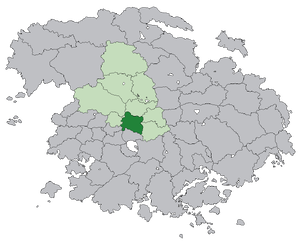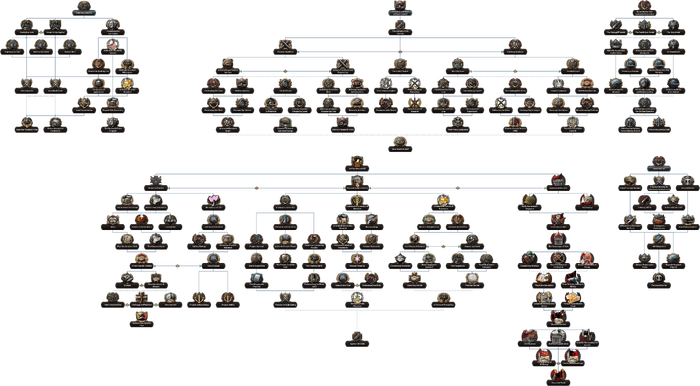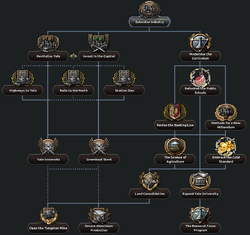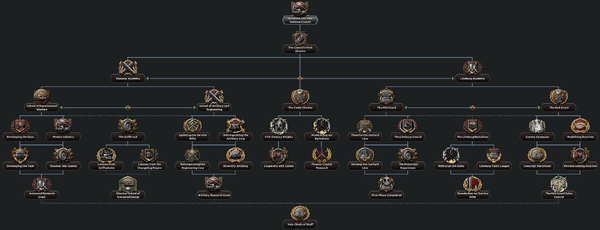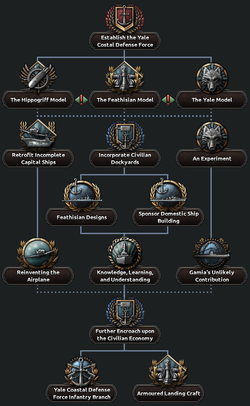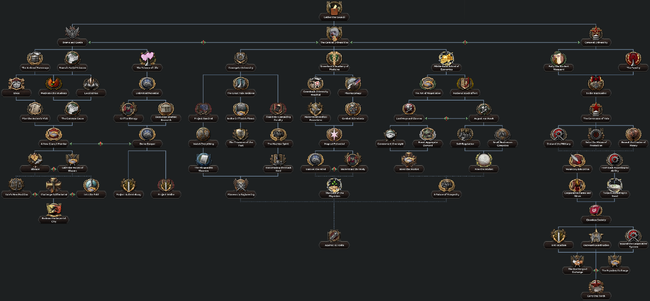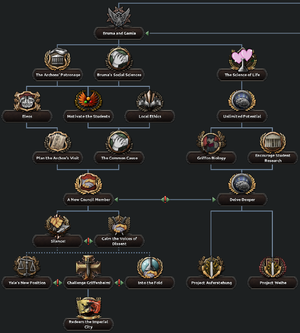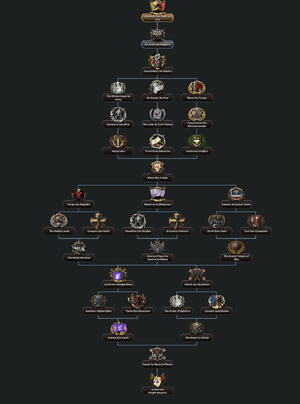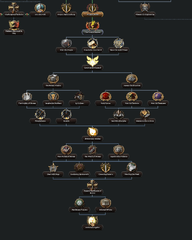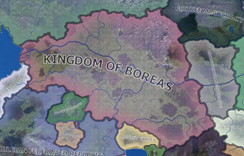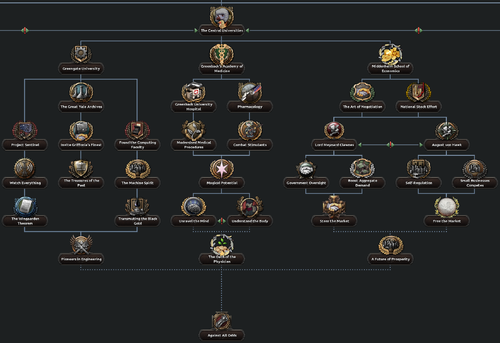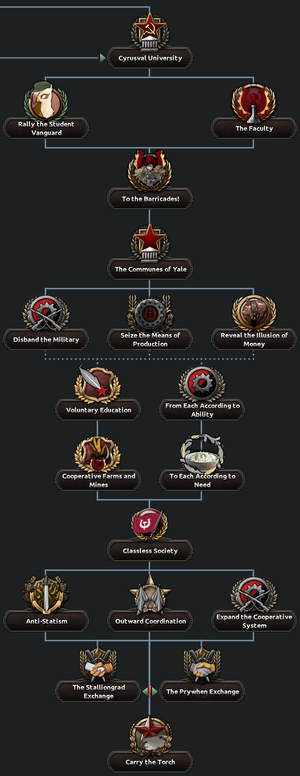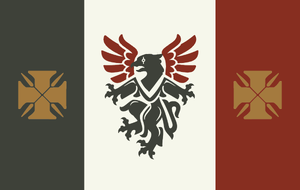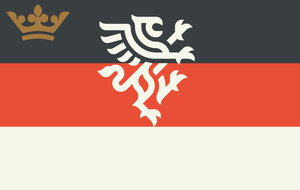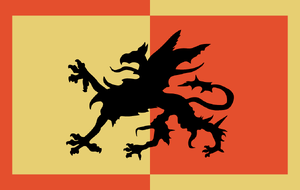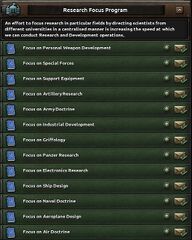
Yale Rectorate
| Attention: This page is in progress!
Our Wizards are hard at work writing or updating this article. Some information may be absent or outdated. Want to speed things up? Visit us on Discord and volunteer to help out! |
| Yale Rectorate | |
|---|---|
| The Light of Science | |
| Ideology | |
| Leader | |
| Ruling party | Der Rat (60%) |
| Population | |
| Ponypower | |
| Race | |
| Stability | |
| War support | |
| Factories | |
| Capital | Greenback |
| Continent | Central Griffonia |
| Diplomacy | Member of the Reichspakt |
| Demonym | Yalish |
| Tag | YAL |
| Color | #B55270 |
In its formation, Yale was able to focus on providing education to the booming new Griffonian Empire. Since then, its institutions have taken over the duchy and established a ruling council of their own - the "Yale Rectorate".
But the limits of the rule of the universities are being approached. The Empire is crumbling, and only the allegiance to the Emperor and the perceived competence of the government is keeping the growing, impoverished lower class in check. If the Rectorate wants to stay in power and continue its scientific vision, should the empire disintegrate, it will have to win the hearts of the people, otherwise who knows what the future may hold for this land of universities.
Lore
The Duchy of Yaledom

The Duchy of Yaledom was vassalized under the rule of Grover I in the 8th Century ALB. Safe in the heartlands of the Empire, the Dukes maintained close contact with the Emperor. Under these circumstances, Yale was able to provide higher education to the Empire's growing nobility. Yale University itself was founded in the ducal seat in 765 ALB, and it was not long before the other cities of the duchy followed with their own institutions.
With time, they grew in prestige and wealth, and students from all over the continent came to learn. With time, however, the local nobility grew ever poorer. Griffonia was changing, and the Industrial Revolution had begun. While factories sprang up and manufactories spurred on in the cities, the nobles continued to rely upon their comparatively undeveloped lands to provide for them, and Yale was losing its place to other cities within the duchy which had taken a greater initiative to industrialize.
It was in 878 ALB that the ducal rulers finally sold their title and rule to the University of Yale itself to save themselves from poverty. Grover III, who was attempting to unify the realm, likely wouldn't have taken kindly to such a large shift in politics, especially one so close to Griffenheim. So as to not provoke action from the Empire, it was decided that the title would be kept alive, if in name only, by the first Rector and father of modern Yale, Borean Wiedergreiff.
Rectors and Revolutionaries
Borean Wiedergreiff was a young and charismatic Polymath. As first Rector, he implemented many reforms making Yale what it has become. Among his earlier actions was to move the capital of the duchy from Yale to the industrial heart of Greenback. He lived by Rationalist philosophy, and ultimately believed ignorance and malice would lead to war and the subsequent loss of knowledge.
It is generally agreed upon that Wiedergreiff was a true visionary, a genius. Many of his creations would prove to be far ahead of their time. Among other things, he laid out the plans for what he regarded as his magnum opus- "The Great Archives", a towering repository of the world's knowledge, for the benefit of all. He believed it would stand as a beacon against ignorance, to achieve peace through the pursuit of science. So revolutionary was this idea, so far ahead of its own time it was, however, that he was never able to even begin. His plans now lie in archives and private collections around the realm, waiting for the day the Griffons will have advanced enough to be able to put them to use.

100 years after Wiedergreiff had come to power, the Republican Revolution swept through the Heartlands.The universities themselves were uncertain of whether to pledge their support to the Empire or the revolutionaries during this time. With the different specializations and beliefs of each university, while many students gave their lives for the Republican cause, just as many found themselves by the young Emperor's side. In this period, the majority of the remaining nobility fled, leaving the universities open to finally finish the move away from the rule of the aristocracy and formalize their power, in the form of the Yale Rectorate. With the transfer of power complete, they set themselves upon the goal of more autonomy from the Empire. As the revolution progressed, it became clear that the Emperor's forces would ultimately win. It was only then, near to the end of the conflict, that the Rectors decided to give him their support. Luckily, their lack of decisiveness ultimately left the lands of Yale largely untouched by the war.
Not all is well though. Yale's industry has lagged behind academia for a while, due to a lack of dedicated R&D investments made by its companies. Most of the education budget has gone to universities, leaving public schools chronically underfunded. The north and Yale remain underdeveloped, with most of the Rectorate's infrastructure efforts going towards southern trade routes along the rivers near Greenback. And still, there is relentless agitation from citizens who are unhappy being dictated to by "out of touch intellectuals". In spite of this, Yale is economically mostly healthy and has a well-functioning government, but one could still say it lacks a soul.
Collegiate Endeavors
The Klaumar Military Academy
Yale is famed for its prestigious educational institutions, but among the lesser known are the military academies of Klaumar and Löwburg.
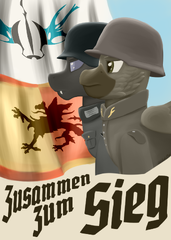
Klaumar's staff were given special permission to study the Empire's first armored division, and received much insight into the effectiveness of such a unit and how it works. Klaumar had also sent several attaches to work with advanced Changeling tanks. These experiences taught them the importance of rapidly moving combat formations. Though there are several schools within the academy, it is dominated by the School of Experimental Warfare, though the senior School of Artillery and Engineering still holds sway. They are currently using their observations to develop the strange and new theory of mechanized tactics, armored formations and combined arms warfare.
The Academy of Löwburg
Löwburg is nearly the opposite to Klaumar. The academy specializes in infantry-heavy warfare and the use of meticulously crafted battleplans and fortifications to achieve victory. Based around the Griffenheim School of Thought, it has large traditional roots, supported further by the Old Guard, who hold the majority of the Löwburg council. The council, made up of the eight most senior and experienced faculty, develop strategies for dealing with almost any scenario imaginable. The academy has also been designing the Gerhard Line, a fortification which has been theorized to be nearly impenetrable if implemented fully. Löwburg has been known to produce very disciplined officers. A significant number of students are impressionable and young, and many are even below the age of enlistment. A large portion of the academies' attendants are also aligned with the "Red Guard", students who believe in leftist ideals, that more must be done by everyone. Though they hold little power, some say they are seeking to gain influence over the academy's curriculum.
Yale University
Yale University itself is the oldest and most prestigious university in the country, but much like the city in which it resides, the institute has been overshadowed by modernity. It was never developed as well as Greenback, and has been superseded as the capital of the realm, though the current head of the rectors, Magnificus Mikusian, is also rector of Yale, and has been the youngest to hold such a position. It has produced many bright minds, including Borean Wiedergreiff himself. Its libraries are unparalleled, though, and it holds a strong tradition of academic excellence. There are many facilities available for its students to use for their own purposes. Yale's academics specialize in Science and Philosophy, but in recent years, some feel that the curriculum is outdated, out of touch with reality and the common griffon, or even contradictory or stagnant. Regardless, Yale continues onwards with its grand scientific vision.
Greenback, Greengate, and Middenheim
The Universities of Greenback, Greengate, and Middenheim are known as Yale's central universities, and each has its own specialties. Greenback is an academy of medicine. Its curriculum sees support from a nearby hospital, where many griffons train and put their education to practice. The academy seeks to advance medicine, to enhance the body, to perform miracles. Greengate, meanwhile, has favored griffons seeking to improve society in other ways for many years.
Though founded by alchemists experimenting with transmutation, it has since been known for its programs in engineering. With close proximity to Yale's center of industry, students here innovate designs in machinery to revolutionize life, to build a better tomorrow. These programs come at a cost, however, something which griffons at the Middenheim School of Economics study closely. Economists here develop theories in capitalist economic policy for the betterment of the realm. Though each institution cover different areas of study, they share the philosophy of using science to serve and improve society.
Bruma and Gamia
The Universities of Bruma and Gamia lie in the West. Bruma's faculty believe in the strength of tradition, and specialize in the Social Sciences. They teach to preserve societal values, that one must go forth into the streets to learn and bring change. They reject harmony and socialism as nothing but Equestrian attempts to export their way of life. Bruma advocates a future guided by the past, by the heartland griffon culture. Such a return to religion would restore the social bonds between the griffons and their rulers.

Gamia however, has a differing outlook. Its biological studies are second to none, perhaps because researchers here believe in the pure, unhindered acquisition of knowledge. Already, they push the boundaries of ethics, to put aside morality in the name of progress. Still, they yearn to stretch the line further, to even eliminate it, to achieve their full potential, and soar to new heights. Neither is quite satisfied with the more liberal aspects of society, and have close ties with the local Prelate of Arcturius. Each also receives additional funding from nearby Romau, seat of the Archonate of Eyr, and hold strong ties to the clergy.
Cyrusval
Cyrusval, in the Southeasternmost corner of Yale, also teaches Social Sciences, but has taken it in a different direction. Students learn about the struggles caused by the system of Capitalist oppression, and work to spread awareness. They support the establishment of a classless utopia, to bring radical change to the land. Cyrusval's ideals are the most fundamentally different from the rest of the universities. Griffons here believe it is the bonds between authority and the proletariat which causes suffering, and the region sees the lowest enlistment rate in all of Yale.
The Future of the Rectorate
As the Griffonian Empire declined over recent years, friction has emerged in the Yale Rectorate. Yale lacks a strong national identity and societal divides are deepening. With the Emperor sicklier than ever, the common griffons are looking for new answers and more and more of them seek to reinvent Yale in one way or another. The technocratic government, led by the universities has not managed to speak to the imagination of its citizenry, which is leading more and more griffons to search for other answers. Something has to take the place the Empire held in the identity of the Yalish, and the Rectorate might have to reinvent itself if it wants to continue like this. Although Rector Mikusian himself believes science should be used to aid the government in helping griffons of society, he may soon be forced to compromise with more radical factions, as revolutionary and reactionary universities try to mobilise the discontent in Yalish society for their own purposes. Will the light of Yale shine bright in the darkness, or will it be snuffed out like so many places of learning before it?
Geography
In 1007, Yale starts with 4 states. Bordering the ![]() Griffonian Empire to the north, the Empire is tre greatest threat to Yale, especially if it goes non-supremacist. A river cuts through Greenback, Yale's most defensive province, which is a good defensive spot should the empire not stage their coup.
Griffonian Empire to the north, the Empire is tre greatest threat to Yale, especially if it goes non-supremacist. A river cuts through Greenback, Yale's most defensive province, which is a good defensive spot should the empire not stage their coup.
Yale's other neighbors, ![]() Greifenmarschen, the
Greifenmarschen, the ![]() Barony of Angriver, the
Barony of Angriver, the ![]() Katerin Principality, and the
Katerin Principality, and the ![]() Free City of Romau, can be allied with, if they select certain foci to ideologically align with Yale. The same can be done with other vassals of the empire.
Free City of Romau, can be allied with, if they select certain foci to ideologically align with Yale. The same can be done with other vassals of the empire.
The Lands of Yale remain relatively underdeveloped, and the two most valuable provinces at the start lie in the South, with more population, infrastructure, and factories. The resources extracted will be more than enough for early game production of basic matériel. Poverty and other factors slow Yale's research and construction speeds greatly, but there is high potential, should the situation improve. Griffonpower also suffers, but will be dealt with in time.
National Focus
Yale has a massive focus tree that can be divided into five individual trees: an Industrial tree, an Army tree, a Naval tree, an Air tree, and a political tree. At the start, the political tree and the naval trees are locked, while the other trees are unlocked; the political tree is unlocked after Grover V's death and a regent is chosen, while the naval tree is unlocked if Yale owns a coastal province.
Industrial Tree
This tree, beginning with the focus Subsidise Industry, focuses on improving the industry, literacy, and research capacity of Yale. The tree can be split into two branches:
- The left-most branch (starting with the exclusive focuses Revitalise Yale and Invest in the Capital) grants the player factories, infrastructure, and an increase in resources (specifically
 steel,
steel,  tungsten, and
tungsten, and  aluminium).
aluminium). - The right-most branch (opening with the focus Modernise the Curriculum) boosts Yale's literacy and societal development, alongside decreasing Yale's poverty. Of note are the final two focuses on this branch (Expand Yale University and The Research Focus Programme); the former grants an additional resarch slot, while the latter gives a boost to research speed and unlocks decisions allowing the player to gain specific research bonuses (see above).
Army Tree
Yale's army tree, starting with the focus Establish the Yale Defense Council, provides a variety of research bonueses into research of weapons and land doctrines. The tree can be split into two main branches (each of which also has two sub-branches), and a smaller branch in the centre:
- Klaumar Academy - This branch focuses on the Mobile Warfare (represented by the School of Experimental Warfare sub-branch) and Superior Firepower (represented by the Schoool of Artillery and Engineering sub-branch) doctrines. Both exclusive sub-branches provide research bonuses in their respective areas (the Mobile Warfare branch, for example, offers research bonuses for Armor). There is also a third sub-branch (The Grifftruck), available no matter which other sub-branch was taken, which offers research bonuses for tanks and motorized.
- Löwburg Academy - This branch focuses on the Grand Battleplan (represented by the The Old Guard sub-branch) and Mass Assult (represented by the The Red Guard sub-branch) doctrines. The sub-branches are exclusive, but the Mass Assult sub-branch can only be gone down if the player has already aligned Yale with the Communists in Cyrusval (see below). The Grand Battleplan sub-branch focuses on increasing Yale's defensive capabilities, while the Mass Assult sub-branch increases Yale's recruitable population. There is also a third sub-branch (The Löwburg Battalions) which offer general buffs to division and infantry equipment.
- The Cadet Charter - This third, smaller branch focuses on areas untouched by the other branches, such as race-specific tech and support equipment, proving research bonuses to both.
There is also a final focus (Yale Chiefs of Staff), available when the player has completed any of the doctrine sub-branches, which provides bonuses based on which university Yale has aligned itself with.
Calculations INCLUDE Klaumar Academy and Löwburg Academy focuses respectively. The Cadet Charter subtree is NOT included.
The Naval tree (opening with the focus Establish the Yale Coastal Defence Force) can only be started when Yale owns a coastal province. The set of exclusive focuses at the start of the tree offer the player research bonuses in one of the three naval doctrines. The rest of the tree mostly gives reserarch bonuses for naval technology, with two focuses granting naval dockyards in random owned coastal states.
Air Tree
The airforce tree (beginning with the focus GreenBack Air) grants the player research bonuses for air technology, air bases, and paratroopers, alongside certain focuses giving air experience to the player.
Political Tree
Until Grover V dies and a regent is chosen, Yale's political trees will be locked. When a regent has been chosen (be it Eros or Gabriella), the first focus Gather the Council will become available. After 14 days, an event will fire, giving the player a choice over which universities will guide Yale into this uncertain future.
 Bruma and Gamia
Bruma and Gamia
The western universities of Bruma and Gamia may be chosen to advise the Rectorate in the coming years. The tree is split into two seperate sections, each focusing on one of the two universities.
Bruma's branch aligns heavily with the university's goal of creating a strong, holy society. This section (starting with the focuses The Archons' Patronage and Bruma's Social Sciences) grants a variety of different buffs, ranging from increasing political power gain to granting an additional civilian factory.
Gamia, on the other hand, focus much more on biological science, and as such their tree grants additional research speed, research buffs, and an additional research slot.
While, to begin with, the universities can work seperately and rule together, a choice must be made on which path to take Yale. Is the future a holy one, dominated by the social scientists of Bruma, or is it a scientific one, pushed forth by the biologists of Gamia?
Bruma - An Arcturian Regency
Should Bruma be chosen (by taking the focus A New Council Member), with the Schwert und Schild in power and Prelate Michael leading, Yale with have two further choices immediately ahead of them. First, the player must choose whether to silence opposition to Bruma's rule (resulting in a decrease in opposition popularity, but also a decrease in stability) or to simply comprimise, flatter and bribe their way to popularity (resulting in an increase in both party popularity and stability).
The next choice will be a decion about Yale's relation to the Empire. If Archon Eros was chosen as regent, Yale has the option of further integrating into the Empire, while keeping some autonomy, through the focus Yale's New Position[1] (a choice which the Empire can ultimately refuse) or simply being annexed outright through the focus Into the Fold, ending the game. Otherwise, Yale will only have the option to declare war on the Empire, gaining a wargoal through the focus Challenge Griffenheim.
Should Yale subsequently take Griffenheim, and take the decision to form Herzland, Yale shall change to the Herzland National Republic, and the rest of the political focus tree opens up. The tree can be split into two sections: The first focusing on the unification of the Herzlands (under the new regent Archon Proteus III) and the implementation of strong, religious values into society (granting general military, research and construction buffs), while the second section focuses on unifying Griffonia in a similar vein to the ![]() Griffonian Empire (granting resources, factories, divisions and the ability to core certain compliant states).
Griffonian Empire (granting resources, factories, divisions and the ability to core certain compliant states).
Of note is the final focus, Crown the Knight-Emperor, which will crown Grover VI in Griffonstone, who, having been trained by the Prelates and Archons in the ways of Arcturius, will lead the Empire into a Holy future that truly honours the Gods.
God bless Emperor Grover!
| Leader | Party | Description | Traits |
|---|---|---|---|
| Supremacy
Schwert und Schild |
|||
| Supremacy
Schwert und Schild |
Gamia - Delve Deeper - Project Auferstehung
| Leader | Party | Description | Traits |
|---|---|---|---|
| Supremacy
Kaiserpartei (Griffonische Kaiserpartei) |
Grover II was the second ruler of the Griffonian Empire, ascending the throne in 785 ALB. By the time of his ascension Grover II was already an accomplished general and he commanded many of his father's forces when he unified the griffon states. The start of his reign was characterised by an Aquileian insurrection, which the Emperor's armies crushed before rebellion could spread throughout the empire. It is said that in his anger, Grover II killed the Discret King of Aquileia himself and ordered Aquila burned. To keep the Discrets from seeking revenge, he married Giselda Discret. The Emperor decided to entrust the Idol of Boreas, the Empire's most sacred relic, to his Brother Guto, who he made King of Griffonstone, starting a period of early stability. In 799 the Emperor started his conquest south, adding Sicameon and Asterion to the Empire. Grover II was still not content with his domain, fearing his eastern frontier with the ponies of the Riverlands. Therefore he sanctioned the Knights of Hellquill to crusade against them. Internal squabbles and economic woes would delay any large scale efforts to attack the riverponies for 40 years. It is widely believed that Grover III and Giselda were the ones constantly fixing the bad domestic policies of their father and husband. |
yal_grover_temporary_trait
| |
| Supremacy
Kaiserpartei (Griffonische Kaiserpartei) |
Gamia - Delve Deeper - Project Weihe
Project Weihe, if selected, will be completed early, in 58 days if events are processed in the same hour they appear.
Upon completion of the final event, there will be a new expansion to Yale's focus tree. This path details the arrival of a griffon who appears to be the divine agent of Boreas and their journey to cleanse the Empire's lands, beginning from taking rulership in Yale. Wargoals and cores are eventually provided for all of the Empire's starting vassals, with the exception of Sunstriker's Clan.
After the herald takes power with Convince the Council, the next set of focuses are intended to prepare Yale for offensive action. Several powerful benefits are provided, and it is best to time these to precede the Empire's inevitable declaration of war on Yale, for the Empire will be the first target, and must be defeated to progress further. The unstated effects of the focus Send the Disciples are that it will give Griffonstone, Romau, and the Empire a national spirit causing a minor -15% debuff to stability and war support.
Once the Empire itself is conquered or divided among its other former vassals, those vassals will be the next target of the Herald's ambitions. Finally, after they have been dealt with, all of the conquered land will be cored, and although there are no further focuses unlocked, the newly-established Kingdom of Boreas will find itself in a very strong spot to fight against any invaders or manually-justified conquests.
 The Central Universities
The Central Universities 
Going down the middle path of the tree, the player will get several bonuses to certain things, depending on what foci they choose. the Greengate sub-tree grants bonuses to electronics, and starts a project which eventually forms a research group. Greenback mainly gives bonuses to army-related modifiers, among other things, while Middenheim has two possible advisors to choose. One of them, Meynard Clawnes, is a socialist, granting 2 offmap civilian factories, 10% production efficiency cap, 30% production efficiency growth, +5% consumer goods factories, +10% factory and dockyard output, and sets the trade law to limited exports.
The other one, August von Hawk, is a capitalist and sets the trade law to free trade, as well as giving +10% civilian factory construction speed, +5% military factory construction speed, -5% consumer goods facctories, +25% free repair and +10% max factories in a state.
Getting to the end of the tree, or owning Griffenheim, a new focus tree will be loaded. A choice is given to the player: Yale can go down the harmonic path, or remain a technocracy. Both will give wargoals on the remaining states of the Empire, and the technocracy path eventually grants a massive bonus to technology, in the form of an ahead of time penalty reduction for all techs.
 Cyrusval University
Cyrusval University
To enter the Communist side of the political tree, the player has to calm down the protest choosing the Cyrusval solution to speak to the masses, it will now unlock the Communist side of the tree, where, unlike the other two side, only one path is available, but at the beginning of the communist path a "support system" is activated where Cyrusval need to get support from the intellectuals, the workers and the military to achieve a communist revolution, the two first focus unlock decision to rally support from all of those faction to overtrow the governement, if there support aren't high a counter-revolution will be launch when the third focus will be completed, they are 4 state of support "Very low", "low", "medium" and "high", when the third focus is taken "to the barricade" a series of event will trigger and decision will be proposed to the player, if the player has at least medium support for any of the 3 faction he should have special decision which would be available only because you have the backing of said faction.
If you do not have enought support and only could choose the default option for the events, the revolution end in a failure and the player will get annexed by the griffon empire. But if the revolution is a success you will proceed with your game as the "Yalish communes" and carry on with the focus tree. During the revolution the player will have suffered a lot of debuffed but after finishing the revolution most of Yales general will leave the player except for one and when the player finish the focus "the commune of Yale" all the debug will be gone and a event will trigger that add support to communism.
The main thing that the player might want to be aware of before taking that path is that after the revolution the debug aren't done, the first 3 focus after "The commune of Yale" will give you debug too:
- Your army: your conscription law will be changed to "The People's Militia" gain 15% recrutable population, but lose -5% speed, -20% mobilisation speed, -10% organisation, -5% division attack & defense, +40% training time and -15 appeal to Refugees.
- Industry: gain 5% consumer goods, -10 Military & civilian construction speed for 365 days.
- Trade: your trade law will be changed to "closed Economy" 0% resource to the market and -75% trade deal opinion factor. (It isn't locked to closed economy, but the player will have to spend 150 PP to put it back to the policy the player desire to have).
But after completing the other focus the debugger will be offset by bonuses and lose the debuff "societal Divide". At some point after the revolution the player will get an even which unlock the decision to investigate on Erich Mühschnabel (the player's leader) To discover if he was truly supporting the revolution, beware that the player will be able to finish the decision line once the focus "Outward Coordination" is completed, when the decision is completed a coup against Müschnabel will be prepared and will trigger later.
At the end of the focus tree the player will gain a war goal against the griffon empire, once defeated, the player will be able to core the empire.
Once the war with the empire done the player will unlock the rest of his focus tree and will have the decision to kill Grover the VI or let him live, the rest of the focus tree consist in annexing the rest of the empire, coring it and become the "Herzland Commune"
After annexing the rest of the griffon empire, the coup event against Mühschanable will trigger and the player will have the choice to either get rid of him for a new leader "Karl Legreif" who provide 8% stability and 5% factory output but add another 5% to consumer goods. This coup will determine which path the focus tree. You can either decide not to launch the coup and stay with Erich Mühschabel and the focus tree will focus on annexing and coring all of the griffon nation of Griffonia or become a trade union and focus on pacifying the pony of Griffonia and become a heaven of equality.
Technology
| Army | Naval | Air | Tech / Industry |
|---|---|---|---|
|
|
|
|
| Doctrine | Racial | ||
|
|
|
|
Politics
National Spirits
Leaders
|
|
This is a community maintained wiki. If you spot a mistake then you are welcome to fix it. |
| Starting leaders | |||||||
|---|---|---|---|---|---|---|---|
| Leader | Leader | Ideology and party | Traits | Description | Comes to power by | ||
Unfeathered Empiricist
|
Born: 21st of October, 964 in Yale
Function: Rector Magnificus of Yale University and Praeses of the Academic Council Biography: Born into a middle class family in the old capital of the Yale Rectorate, Mikusian lived through the turbulent times of the Republican revolution as a teenager. Although many students of the Yalish universities fought for the various sides of the revolution, the country was spared the ravaging effects of war, with the Rectorate only choosing sides at the final moments of the conflict. The revolution left an impact on young Mikusian, who heard about the destruction war could cause via radio and newspaper. Like many young Yalish griffons, Mikusian grew up with tales of the country's enigmatic founder, Borean Wiedergreiff and the young griffon devoured all of the famed polymath's treatises during the revolution. By the time he enrolled for philosophy in Yale's university, Mikusian was a firm believer in Borean's rationalist philosophy of achieving peace through scientific advancement. Living and studying in the hallowed halls of Yale only strengthened the student's believes and by his second year, he decided he wanted to be a scientist and teach for himself. And so he did, finishing his studies without delay and writing his dissertation on the works of his idol. "Pax Scientiam: A dream worth pursuing?" was a smash hit across the academic community, securing Mikusian a teaching position. The scientist proved to be a popular lecturer and sometimes griffons had to sit on the lecture hall's stairs if they wanted to attend his vivid explanations of history, philosophy and discussions on the future of Griffonia. A final twist came in 1001, with the elections for the position of Rector. Urged by his students to stand, Mikusian won in a landslide, becoming the youngest Rector of Yale since Borean Wiedergreiff himself. Now the head of state and government of Yale, Mikusian has overseen the slow decay of the Rectorate alongside the rest of the Griffonian Empire. But the griffon has never stopped dreaming of a different future. Portrait By: Scroup |
| |||||
Grassroots Democrat
|
Born: 12th of February, 985 in Greenback
Position: Leader of the New Sparkle Movement Biography: The bustling city of Greenback supports a burgeoning middle class. Georgina Fredrika Schüler was born into one such family. Her father a mechanic and her mother a clerk. Georgina's parents were gentle griffons, wary of violence after the failed revolution of which she only knew from stories. Like many in Yale, the Schüler family was looking for new answers outside. They found theirs in Equestria and harmony instead of some radical movement. Georgina was raised, unlike many griffons, to see the good in everybeing, to be optimistic and to strife for change from within. The day Georgina passed the entrance test for Yale University was the proudest day of her parents' lives, as she was the first in the family to achieve this. When she set off to the other side of the country, she promised she'd not lose her heart. Yale university was fascinating to Georgina, but also in a way it felt stagnant. As if it was in a different world, out of touch with reality. The teachers were fine, especially Rector Mikusian, but the curriculum felt outdated and contradicted government. For all the talk about science and philosophy, Yale's government felt like it was impeding progress and disregarding the common Yalish griffon. There was no harmony. So, Georgina, optimistically, began to agitate for change, for a New Spark. First with a small group of friends in private. Then in Yale's university, later around all of Yale in public. The Yalish government carried on with its grand scientific visions, unbothered by the growing movement in-and-outside the universities. Democracy, a constitution and self-determination were the demands which resonated louder and louder through the streets of the Rectorate. And after a war where many griffons had to make the ultimate sacrifice, these demands could no longer be ignored. Rector Mikusian called his own student to his side and asked her to lead to preserve harmony. The New Sparkle had started a fire. Portrait By: Scroup |
| |||||
Father Complex
|
Born: 27th of November, 976 in Cyrusval
Title: We are all equal, comrade. Biography: Erich Mühschnabel never had to conquer his bread. As the second son of a wealthy industrialist, Erich could have spent the rest of his life in luxury. His childhood was spent in bliss, as Erich received the best tutors money could buy. He turned out to be bright and inquisitive, and would have been a worthy successor to the family business, were it not for his older sister. Irene Mühschnabel was just a tad bit more cunning than her brother, always managing to garner her parents' favour over Erich. When the time came, Irene enrolled in Middenheim University, while Erich went to his own Cyrusval. The difference could not be much greater. Middenheim's grand halls taught classical economics and statecraft in a tranquil environment, a walled garden away from the hustle and bustle of the world. Cyrusval was a rowdy place of loud students, of debating clubs and radical teachers. The home of Professor Willie Scherler, an inspiring socialist who would later lead the fight for a better world in the woods of Angriver. So, as Irene studies the intricacies of profit maximalisation, Erich was taught the inherent contradictions of the capitalist mode of production. Both siblings graduated cum laude, with Irene being allowed a prominent position in the family business, while Erich was cast out of the family as a failure. Instead of business, Erich would get a teaching position in social science, where he contributed to the ever-radicalising faculty. A sense of urgency and an air of change filled the red halls of Cyrusval as the Empire faltered and to everygriffon's surprise, the students and teachers elected Mühschnabel, the most radical candidate, as rector in the 1007 elections. When the crisis in Griffenheim escalated, Erich managed to convince national government that he would be able to mend the rifts in Yalish society. Instead, he would use the new power to prepare for a revolution. The Mühschnabel estate was one of the first buildings to be set aflame in the ensuing violence. Portrait By: anyazen |
| |||||
Passionate Prelate
|
Born: 15th of June, 961 in Crona Province
Function: Prelate of Yale and Member of the Academic Council Biography: Michael Eisenklau was born near the Imperial city of Crona as the seventh chick in a family of peasants. The family barely scraped by and things spiralled out of control after a failed harvest in 978 spiralled Michael's village into poverty. After it was clear the local authorities refused to help, the peasants, including Michael's parents and older siblings decided to go and take their due from Crona itself. Unbeknownst to them, they were part of a massive movement which would soon fracture the Griffonian continent. Michael would never see any of them again. Left alone to care for his younger siblings, the peasant's son turned to the only place he knew could help; the Temple. There the young griffon, weaker in body than his sturdy older brothers, managed to impress the Arcturian priest by challenging him to a duel for a chance at earning a wage. Michael lost that duel but earned himself a job, to which he tenaciously devoted himself. As the fighting raged around the Empire, sometimes coming precariously close, Michael learned the values of the different aspects of Arcturius. A Smith who can burn away impure elements through war and forge together what is fractured. A Warrior loyal, honourable and unflinching in conflict. And a leader willing to sacrifice himself to a greater cause. Michael had taken these lessons to heart long before he had completed his formal education and as the Empire licked its wounds after the revolution, he began his career in the Hierarchy of Arcturius. First as a priest to one of the many towns in the Herzland who had lost their religious leader in the fighting. Later on, as a clerk for Archon Proteus III, where he got a great deal of respect for the Warrior-Priest. Although Proteus sometimes joked about the griffon's 'puny stature', the Archon was never mean to the former peasant. And when the position of Prelate of Yale opened up in 1005, Proteus nominated Michael himself, hoping that the commoner might be able to help heal the divides in Yalish society. Prelate Michael set to the task with great enthusiasm, reinvigorating the Triarchy in Yale with fiery speeches, charity and the help of the Sword and Shield movement, earning him a spot at the table, shifting the balance of Yalish politics in his favour. Portrait By: Vasily |
||||||
| Post-1007 leaders [may contain spoilers] | |||||||
| Leader | Leader | Ideology and party | Traits | Description | Comes to power by | ||
Union Chairman
|
Born: 2nd of May, 959 in Zeltstadt, Longsword
Occupation: Chairgriffon of the Heartland Trade Union Federation Biography: Born to immigrants from Longsword, a region whose fortunes would decay rapidly over the course of his life. Karl Legreif had a difficult childhood. He was bullied by the Yalish children for his background, but Karl would not be walked over easily. The griffon fought his bullies at every opportunity. The bullies of other griffons too. Sometimes he'd win his battles as well. Karl turned out to be quite capable as an artisan and learned the trade of wood turner. He had just joined the Trade Union when the Republican Revolution ravaged Griffonia. For a while, it seemed the biggest bullies of all the continent would finally be defeated and Legreif enthusiastically struck at every opportunity. It was not to be, however, and the revolutionaries fled north, leaving Karl and the Yalish trade union movement disillusioned. The years went by and the immigrant from Longsword became ever more important in the union movement. Increasingly, the working class organised and fought for their rights. This trend did not go unnoticed by the professors and students of Cyrusval University, who soon provided the theory for the Union's practice. form them, Karl learned that no wage agreement with the capitalists could ever give the workers their due and that only a shift in power could forge unity and brotherhood. The collapse of the Griffonian Empire showed the cracks in Yalish society and increased class consciousness in the Rectorate as divisions between the learned and capitalist class and the workers became ever more clear. If threatened, like in Longsword, the ruling class would not be above allying with racist maniacs to cling on to power. Instead of turning to supremacists, Rector Mikusian reached out to Cyrusval to bridge the gap between classes. But there they sensed a new age in the making - instead, the red university successfully allied with the Unions to bring revolution to Yale and beyond. When the leader of the students turned out to have gone mad, however, something had to be done. So, Karl Legreif, now leading all trade union federations in the Heartlands, took power into his own claws, determined to ensure that no being would be bullied again. Portrait By: anyazen |
| |||||
Resurrected Autocrat
|
Grover II was the second ruler of the Griffonian Empire, ascending the throne in 785 ALB. By the time of his ascension Grover II was already an accomplished general and he commanded many of his father's forces when he unified the griffon states. The start of his reign was characterised by an Aquileian insurrection, which the Emperor's armies crushed before rebellion could spread throughout the empire. It is said that in his anger, Grover II killed the Discret King of Aquileia himself and ordered Aquila burned. To keep the Discrets from seeking revenge, he married Giselda Discret, the Empire's most sacred relic, to his Brother Guto, who he made King of Griffonstone, starting a period of early stability. In 799 the Emperor started his conquest south, adding Sicameon and Asterion to the Empire. Grover II was still not content with his domain, fearing his eastern frontier with the ponies of the Riverlands. Therefore he sanctioned the Knights of Hellquill to crusade against them. Internal squabbles and economic woes would delay any large scale efforts to attack the riverponies for 40 years. It is widely believed that Grover III and Giselda were the ones constantly fixing the bad domestic policies of their father and husband.
In 852 the ageing Emperor decided to finally press forward. He flew east at the head of a massive host of knights and soldiers, eager to finish his conquest of the Griffonian continent. Battle after battle was fought and Grover himself was almost invincible in his enchanted armour, the terror of his foes. That was, until the Nimbusians rallied to save what was left of River City. The Strategos of the pegasi force had lured the griffons into a chokepoint. There, the unthinkable happened. The towering griffon was in the thick of battle, leading his most faithful knights to punch a hole in the unflinching Nimbusian battleline, when a startled young hoplite through his spear at him instead of staying in formation. Grover was hit through the eyes and died instantly, which routed his forces. And now, he has returned to Griffonia to finish what he started |
| |||||
Boreas' Aura
|
"Who I was matters not. I am the Herald of Boreas now. I hear his commands and serve him. I spread his word to all griffons and love all his children like he does. I will do away with the lies and the false prophets who came before. I will defend his teachings and his honour against those who refuse to listen. I will bring low walls and build bridges. I will wear the sword and the shield. I will create and I will destroy. In the name of Boreas, to whom we owe worship."
|
| |||||
Parties
| Political parties | |||||
|---|---|---|---|---|---|
| Name | Ideology | Leader | Popularity | ||
| Der Rat Der Akademischer Rat |
Technocracy Non-Aligned |
Rector Magnificus Mikusian | 60% | ||
| Neue Funkeln | Harmonic Socialism Harmony |
Georgina Fredrika Schüler | 10% | ||
| Die Vorhut Die Vorhut der Studenten |
Anarcho-Communism Communism |
Erich Mühschnabel | 10% | ||
| Schwert und Schild | Authoritarian Theocracy Supremacy |
Prelate Michael | 20% | ||
Staff and Designers
|
|
This is a community maintained wiki. If you spot a mistake then you are welcome to fix it. |
| Name | Trait | Requirement | Effect | Cost |
|---|---|---|---|---|
| Fortification Engineer |
See description:
Gerhard Silverbeak was born in 929 in the province of Osnabeak in the Strawberry Duchy. At the age of 18, he joined the prestigious Griffenheim Imperial Military Academy, completing an education as an engineer. For the next 45 years of his life, he would serve with distinction, proving especially resilient during the Republican uprisings where his defensive doctrines proved the undoing of many Republican offensives. In 992, he retired from the Imperial Army with the rank of major general. Since then, he has joined Löwburg Academy as a professor, being an adamant proponent of the importance of defensive doctrine within modern warfare. |
|||
| Civilian Industry Organizer |
|
|||
| War Industrialist |
|
|||
| Prince of Terror |
|
|||
| War Advocate |
|
|||
| Illusive Gentlebeing |
|
|
||
| Name | Trait | Requirement | Effect | Cost |
|---|---|---|---|---|
| Super Heavy Tank Designer |
|
|
||
| Mobile Tank Designer |
|
|
||
| Name | Trait | Requirement | Effect | Cost |
|---|---|---|---|---|
| Battlefleet Designer |
|
|
||
| Celestial Sea Fleet Designer |
|
|
||
| Coastal Defense Fleet Designer |
|
|
||
| Name | Trait | Requirement | Effect | Cost |
|---|---|---|---|---|
| Range-focused Aircraft Designer |
|
|
||
| Heavy Aircraft Designer |
|
|
||
| CAS Designer |
|
|
||
| Name | Trait | Requirement | Effect | Cost |
|---|---|---|---|---|
| Toolbox Manufacturer |
|
|
||
| Infantry Equipment Designer |
|
|
||
| Motorized Equipment Designer |
|
|
||
| Advanced Artillery Manufacturer |
|
|
||
| Name | Trait | Requirement | Effect | Cost |
|---|---|---|---|---|
| Industrial Concern Railway Company |
|
|
||
| Electronics Concern |
|
|
||
Flags
| Flags | |
|---|---|
| Flag | Information |
 | |
 | |
  | |
 | |
 | |
 | |
  | |
  | |
 | |
 | |
Economy
Laws and Development
Industry and Resources
Military Factories |
Naval Dockyards |
Civilian Factories |
Fuel Silos |
Synthetic Refineries |
|---|---|---|---|---|
| 3 | 0 | 5 (-3) | 0 | 0 |
Oil |
Aluminum |
Rubber |
Tungsten |
Steel |
Chromium |
Crystal |
|---|---|---|---|---|---|---|
| 0 | 18 (-9) | 0 | 9 (-5) | 27 (-14) | 0 | 0 |
Military
Army
|
|
This is a community maintained wiki. If you spot a mistake then you are welcome to fix it. |
| Type | No. | |
|---|---|---|
| Infateriedivision | 3 | |
| Kadett Division | 3 | |
| Universität Ritters | 1 | |
| Total divisions | 7 | |
| Ponypower used | 34.80k |
| Field Marshals | ||||
|---|---|---|---|---|
| Field Marshal | Traits | Description | Skills | Race |
While not the most brilliant officer, he is unlikely to cause trouble.
|
See description:
Gerhard Silverbeak was born in 929 in the province of Osnabeak in the Strawberry Duchy. At the age of 18, he joined the prestigious Griffenheim Imperial Military Academy, completing an education as an engineer. For the next 45 years of his life, he would serve with distinction, proving especially resilient during the Republican uprisings where his defensive doctrines proved the undoing of many Republican offensives. In 992, he retired from the Imperial Army with the rank of major general. Since then, he has joined Löwburg Academy as a professor, being an adamant proponent of the importance of defensive doctrine within modern warfare. |
|||
A natural born strategist that is able to adapt to the dynamics of the battlefield.
|
See description:
Born: 21th of December, 978 in Greenback Rank: Generaloberst in Training Biography: Peter Zuckergreif, born in 978 in the capital city of Greenback, had always a love of cars, and wished to have one for himself. Sadly for him he was born in a rather poor family, so the best he could do was make believe with his friend. Everything changed, however, when he saw a sight which would stay with him for the rest of his life: a Panzer. From that day on, his one goal was to one day drive one of these beast, so he begged his parents to be send to Klaumar, a Military Academy who was famous for having 'strange' method of warfare in their lectures. With hard work, much studying and some financial help from a professor at Klaumar, Peter managed to become a student in 999, and quickly showed his teachers what knowledge he had. Even in his first year he managed to come up with impressive theories on how to deploy tanks, developing the many roles of armoured vehicles in warfare. Sadly for him, driving a tank was not possible for an officer, so Peter focused on revolutionizing the usage of tanks in the Imperial Army. In his last year at Klaumar in 1003 he met his pupil Apfel von Kuchen, which ended in a close friendship between the two, although a few griffons insist that there was more to it than they would let on. After Zuckergreif graduated, he enlisted directly into the Yalish Army, and too his surprise he became a staff officer of the major general Gerhard Silverbeak, who, while technically retired, was still in command of Yale's field army. Gerhard took it into his claws to train Peter to become his successor, and while they both have very different ideas of how modern warfare will look, resulting in hour-long debates, Silverbeak still decided to train Zuckergreif. The old Generalmajor even got Apfel von Kuchen a command position. |
|||
| Generals | ||||
|---|---|---|---|---|
| General | Traits | Description | Skills | Race |
While not the most brilliant officer, he is unlikely to cause trouble.
|
See description:
Born: 1st of February, 945 in Appenage Rank: Generalleutnant Biography: The live of Sabine Bucher as a young chick was a hard one, with her family being poor farmers in the region of Appengen. She watched most of her siblings die, either because of sickness or in one case, of starvation. At the young age of 14 she left her home quietly and went on a journey to the Imperial Crownlands, where she enlisted into the army under a false identity. After her training was done she was sent to Yale for training and she would end up studying in the Academy of Löwburg thanks to a recommendation from her superior. Sabine's great memory served her well, but the training was hard for the peasant griffon. In the end she graduated, but just barely, in 963. During the next 10 years, she quietly rose up the ladder in the Imperial Army. But then, as a shock for everygriff, the Republican Revolution broke out. While she herself could understand the struggle of the griffons, she could not betray her newfound friends, and so she whipped the Yalish military, which was on the verge of mutiny, back into shape, commanding many more troops then intended. The Rectorate in Yale rewarded her valorous action with nothing, wishing to remain neutral in the conflict. In spite of orders, Sabine still led her forces over the Yalish border to fight the Republicans, inspire nationalist fervour in Yale. When the Empire was re-established and the republicans driven out, the Rectors finally acknowledged Bucher. For her bravery she was recommended to be promoted to Generalfeldmarshall, but she declined, insisting she only did her duty. Sabine would spent the rest of her years in Yale, where she has become a famous Griffon for her action in the war and her humble refusal of a promotion. |
|||
See description:
Heinz Featherhoff was born in 941 in the town of Asselt in Greifenmarschen. Born to a local merchant of the petite bourgeois class, Featherhoff's father managed to secure his son a post to Löwburg Academy at the age of 18, where he studied as an infantry officer before joining the Imperial Army. During his 30 years of service, Featherhoff fought in the Republican Uprising, gaining the rank of Lieutenant Colonel. After his tenure in the army, he rejoined his alma mater as a professor. Recently, he has shown an affinity towards the radical Red Guard, and is seen as the only senior staff who openly supports their views. |
||||
See description:
Born: 12th of March, 981 in Yale Rank: Fähnrich Biography: Apfel von Kuchen is a young lesser noble chick from the city of Yale, in accordance with her parents' wishes, enlisted in the University of Middenheim in 1001 to study economics. It did not take long for her to realise that this study was not for her and she decided on a radically different path. After convincing one of her professors to lie to her parents about her status, she enrolled in the Klaumar Academy in 1003, and quickly became a star student of the institution, stealing some fame from her senior on the Academy and prodigy himself, Peter Zuckergreif. During her time in Klaumar it became clear to her that she wanted to stay with the Yalish Army. Eventually she made friends with her senior and Academy rival Peter Zuckergreif, although the two still don't agree on the methods of warfare. After Peter graduated and left Klaumar there were few students who could keep up with Apfel. In 1005, while being still a student at Klaumar, she got invited into the Imperial Army, to join as an Fähnrich, and while she has technically not finished her schooling yet a chronic shortage of staff officers and a few good words from Peter, got Von Kuchen her position. Thus, with her parents still in the dark about her choices in life, the newly minted officer knew her future. |
||||
This leader commands from the rear, preferably as far away from the frontlines as possible to avoid exposure to 'unnecessary dangers'.
|
See description:
Born: 13th of September, 979 in Middenheim Rank: Freshly promoted Wachtmeister |
|||
Yale Rectorate's navy is non-existent
Air
Yale Rectorate's air force is non-existent
Strategies and guides
Starting Situation
Yale's Military is comprised entirely of its Army. There is no air force or navy to speak of, but the academies have yielded generals with some fairly desirable starting traits. There are 35k griffons deployed in seven divisions of varying experience, with 6k in reserve. Of these seven, three are cadet divisions, generally only useful for covering ground and little else, three more are standard infantry divisions which can serve as a decent backbone for the military, and the last is made up of Yale's finest, seasoned knights.
Generally, they begin with fewer numbers than most of their neighbors within the Empire
Threats and Opportunities
 Griffonian Empire - Yale sits directly within the Heartlands of the Empire, and it should be of no surprise that its politics will revolve around their overlords. Should Yale find itself in opposition to Griffenheim, the fight will likely be tough- the Imperial forces are more numerous and make use of new tank and air technology Yale has yet to procure. They also have twice as many factories, in addition to their greater population base. Most of Yale's paths will result in a war with the Empire, and if Yale does not initiate, the Empire typically will. To secure the Imperial Estates though, would be a major boon and unlock many more opportunities, though its controller will also become a target for others factions...
Griffonian Empire - Yale sits directly within the Heartlands of the Empire, and it should be of no surprise that its politics will revolve around their overlords. Should Yale find itself in opposition to Griffenheim, the fight will likely be tough- the Imperial forces are more numerous and make use of new tank and air technology Yale has yet to procure. They also have twice as many factories, in addition to their greater population base. Most of Yale's paths will result in a war with the Empire, and if Yale does not initiate, the Empire typically will. To secure the Imperial Estates though, would be a major boon and unlock many more opportunities, though its controller will also become a target for others factions...- The other vassals of the Empire, especially those neighboring Yale,
 Greifenmarschen, the
Greifenmarschen, the  Barony of Angriver, the
Barony of Angriver, the  Katerin Principality, and the
Katerin Principality, and the  Free City of Romau, will have the opportunity for a variety of interactions, depending on what focuses they select. These may range from mutually beneficial agreements and alliances to outright war, though war will typically take some time. Although Yale isn't the strongest of the vassals, it can hold its ground relatively well.
Free City of Romau, will have the opportunity for a variety of interactions, depending on what focuses they select. These may range from mutually beneficial agreements and alliances to outright war, though war will typically take some time. Although Yale isn't the strongest of the vassals, it can hold its ground relatively well.  Aquileia - By the time Aquileia begins marching on the Empire, they will likely have re-integrated the surrounding territories. If the Empire is still divided, it will be a very tough fight, especially if they have allied with the
Aquileia - By the time Aquileia begins marching on the Empire, they will likely have re-integrated the surrounding territories. If the Empire is still divided, it will be a very tough fight, especially if they have allied with the  Republic or
Republic or  Skyfall. The lands of Yale itself may border Aquileia when the invasion comes.
Skyfall. The lands of Yale itself may border Aquileia when the invasion comes. House Avian to the Southwest begins very weak, but should they attempt to reunite the Duchy of Verenia with the other houses, they won't be as insignificant. This will take quite some time though, and any competent player should have no trouble dealing with them if they must, united or not. War should not be expected.
House Avian to the Southwest begins very weak, but should they attempt to reunite the Duchy of Verenia with the other houses, they won't be as insignificant. This will take quite some time though, and any competent player should have no trouble dealing with them if they must, united or not. War should not be expected.
Gameplay Mechanics
The Research Focus Program
Upon completion of The Research Focus Program in Yale's focus tree, Yale unlocks a set of decisions giving bonuses on, primarily, military-related technologies. There is no cost to choosing any. Only one can be taken at a time, giving a 1x 20% research bonus for the chosen technology, and locking and hiding all decisions associated with the program. After a period of 200 days, the decisions are unlocked once more. Each decision can be repeated, and taken as many times as desired.
Guides
+ Add it to this article and help other players!
Please note the style guidelines.
Awards
- Main article: Awards

Gallery
References
Template:Reflist
- ↑ Even if Yale chooses this, and the Empire agrees, they will still approach Yale with the offer of annexation after they've taken the focus Reward the Faithful. In this event, Yale will have the choice of being annexed, requesting to stay a puppet, or resisting (resulting in war). Neither staying as a puppet or resisting offers any further content.

